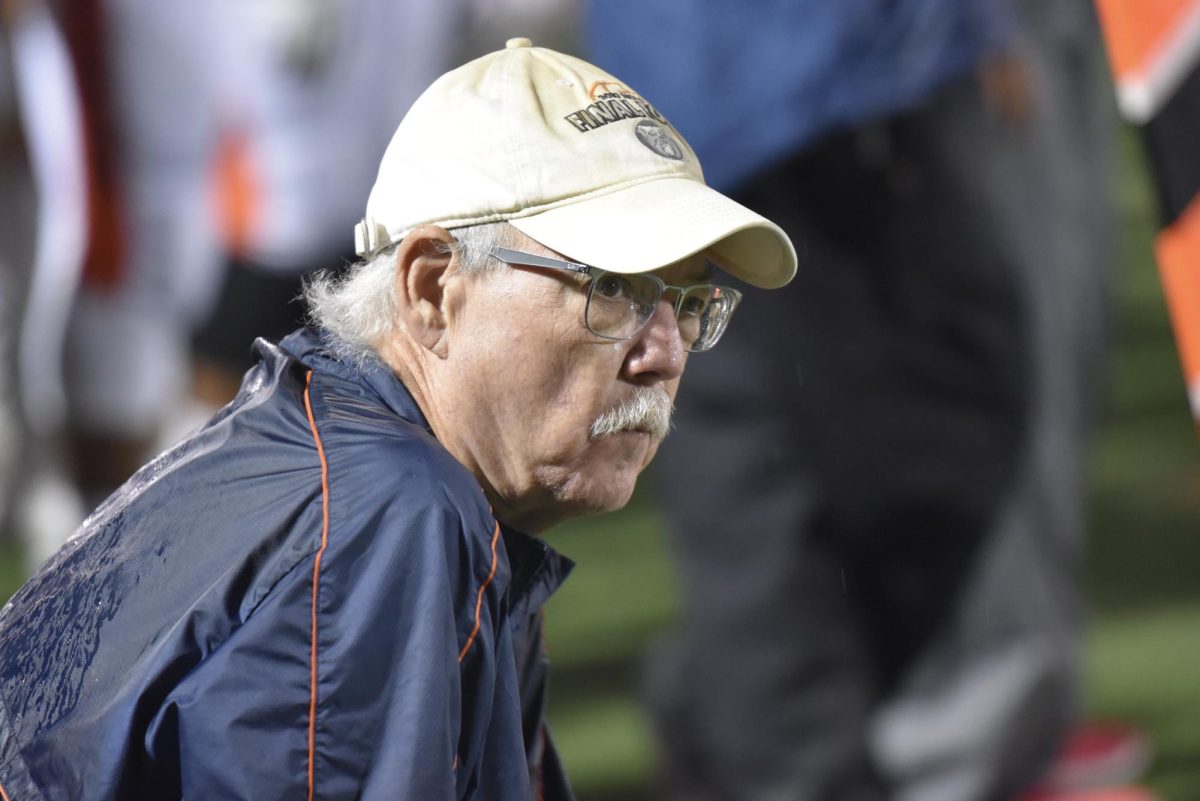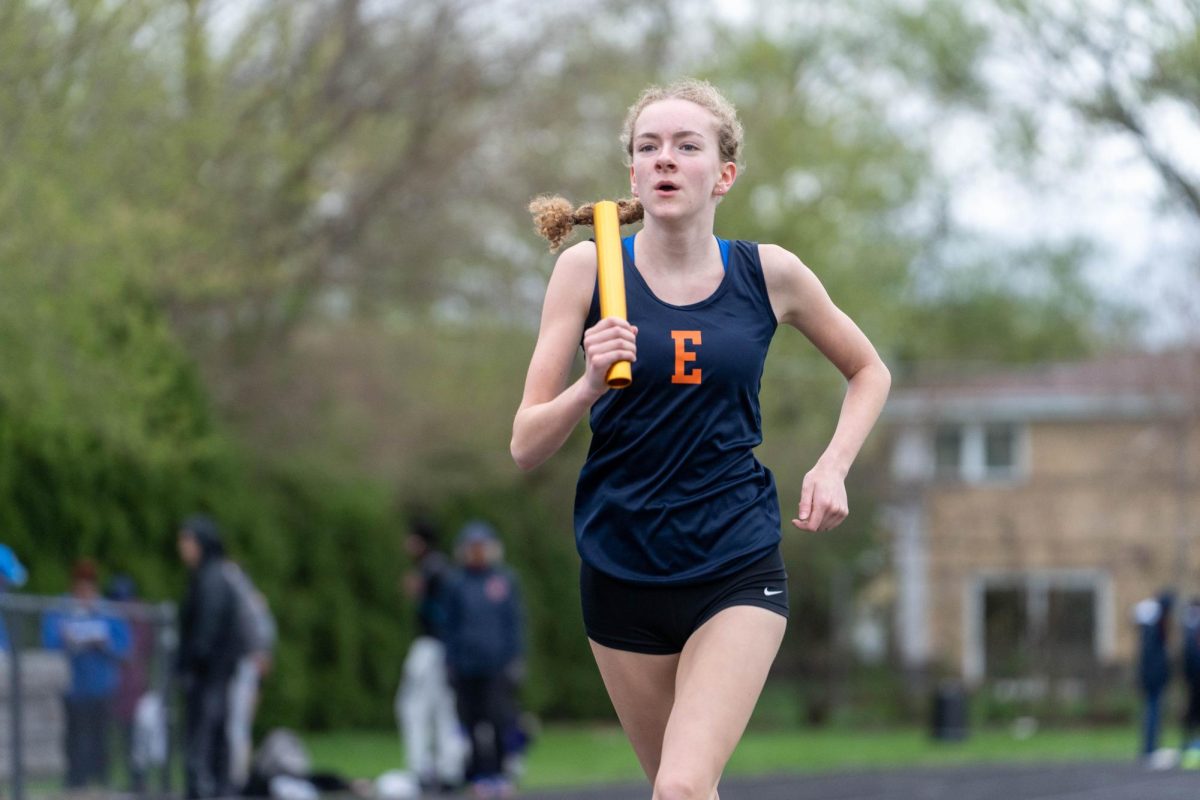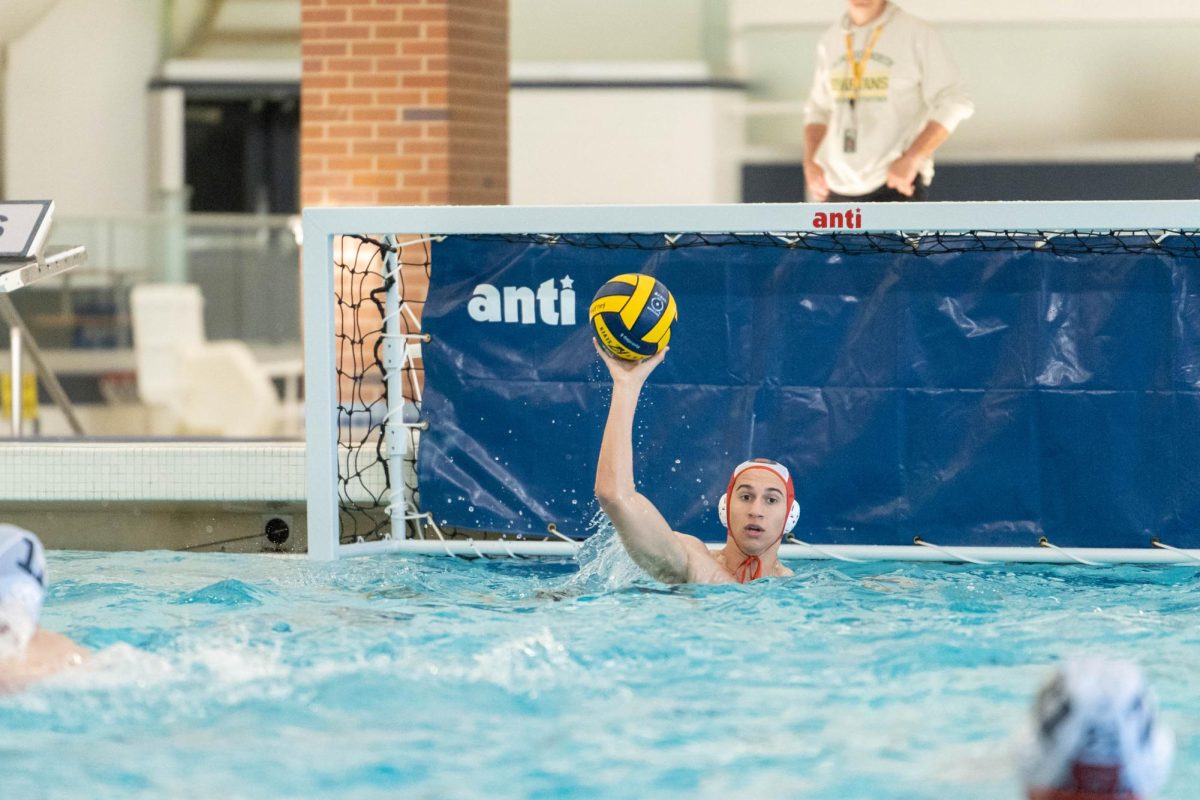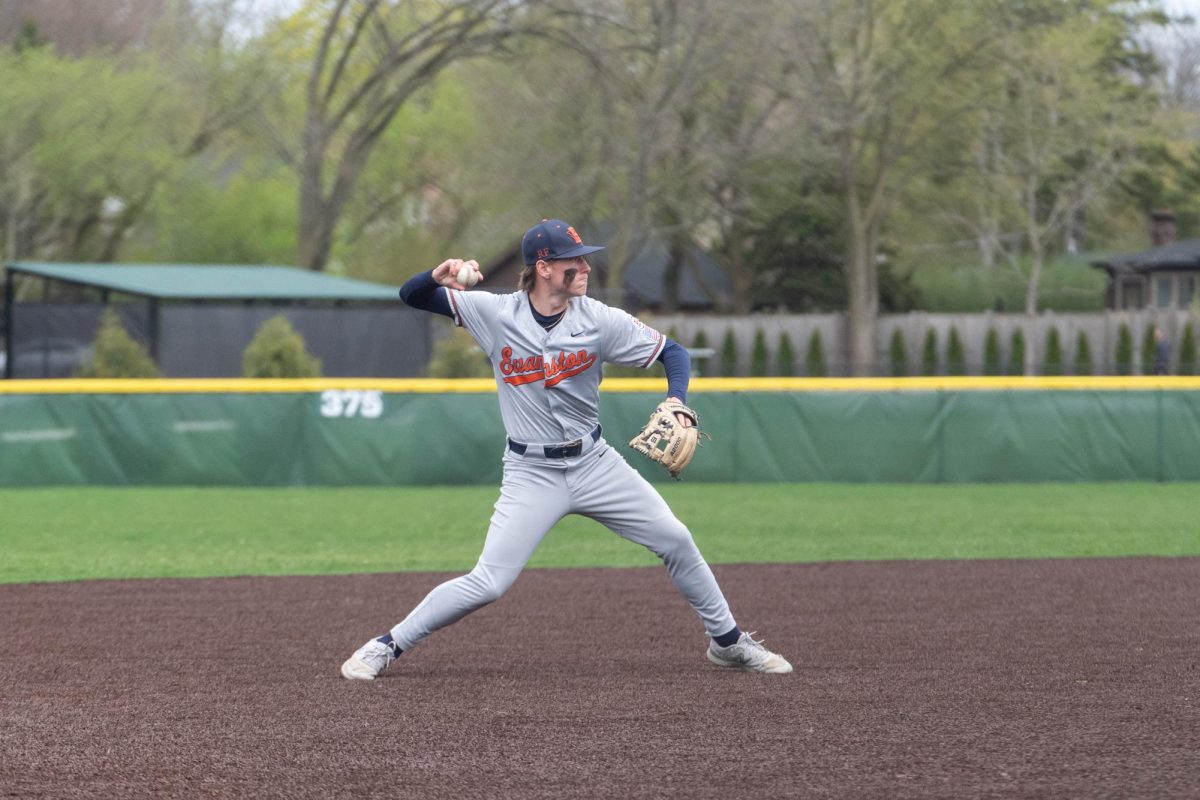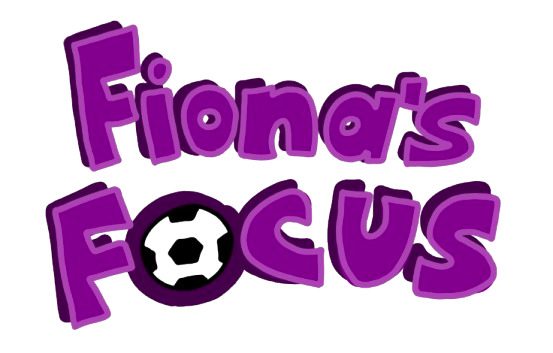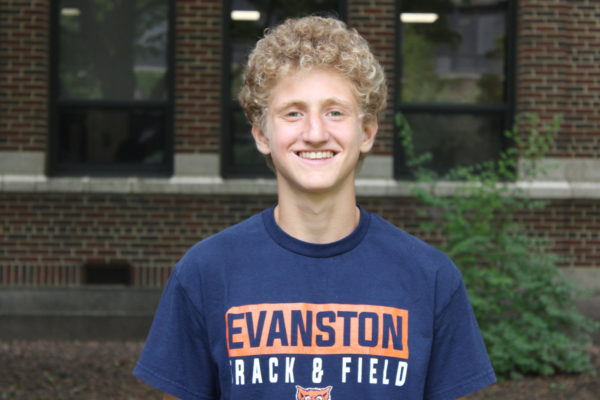Dennis Mahoney and I sat on opposite sides of the table in room S103, the Evanstonian headquarters, about to start our interview. The usual roles were reversed; for once, he was answering the questions.
Mahoney, a reporter, has interviewed hundreds of students in his 33 years covering ETHS sports. He’s written thousands of stories and gone to countless games. Attend a varsity competition and there’s a good chance you’ll see him on the sidelines – white mustache, Evanston jacket, pad of paper in hand. Although his stories have been read by Evanston coaches and athletes for decades, many, including me, know little about the man himself.
Before I could open my computer to my list of questions, he asked me how I felt about my recent cross country race. He had already published a story about it, but he was curious; he cared. I said I felt good. We talked about how it compared to the rest of my season.
Our conversation paused as I logged into my computer. He surveyed the rows of desktops and issues of the Evanstonian scattered throughout the classroom.
“It’s been a long time since I was in a high school journalism room,” he chuckled.
I hadn’t known he was on his high school paper. I asked him about the rest of his journalism backstory.
He told me that he had discovered his passion for sports journalism as a student at Thornton Township High School and wanted it to be his life’s work. After graduating high school, he bounced around Illinois, writing for papers across the state before landing at Pioneer Press, the local division of The Chicago Tribune, in 1991. There he covered sports for ETHS, Loyola Academy and New Trier Township High School. It was a demanding role, requiring him to work 60 hours a week to keep up. In 2010, Pioneer Press ceased their sports coverage, and after 43 years of sports reporting, Mahoney retired.
But retirement quickly got boring. His wife, a special education teacher, was still working, and he didn’t have much to do. He wanted to continue writing, and he knew that with Pioneer Press’s local coverage discontinued, sports reporting was needed more than ever.
“I was like, ‘You know what? These kids still have stories. Their parents, their grandparents, want to read about it,’” he recalled.
So he returned to Evanston – a community where he had felt appreciated.
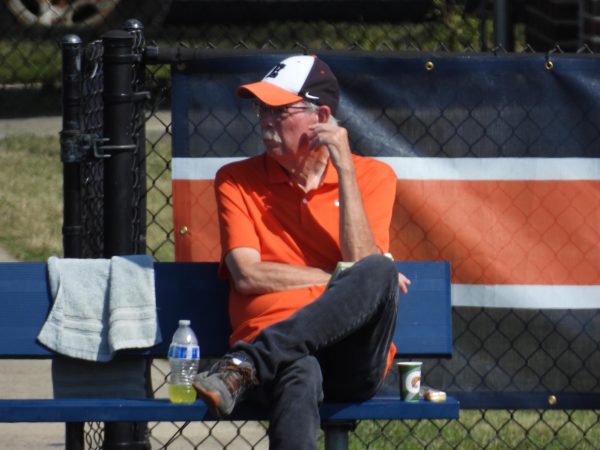
“I got so much help from so many people while I was here for Pioneer Press that I [decided I] could give something back,” he explained.
ETHS Athletic Director Chris Livatino welcomed him with open arms, offering him the position of Sports Information Director, where he would be allowed to write about whichever games he wanted. Mahoney accepted, but strictly on a volunteer basis. During an interview, Livatino recalled that when he tried to offer Mahoney payment, he vehemently refused.
“I never got in it for the money,” Mahoney told me, also mentioning that no pay meant no obligation to write about what he didn’t want to cover.
In his 11 years as Sports Information Director, Livatino estimated Mahoney has written 2,500 stories, “all just out of the goodness of his heart.”
Both Mahoney and Livatino described his style of sports reporting as “telling a story.” It’s what I have experienced when he has written about me. Not only do his pieces capture my accomplishment, they also describe the work it took to get there and how it felt to succeed. It’s a style that allows athletes to feel valued and keeps families and alumni invested in ETHS sports.
“I get so many comments from parents of alumni that are like, ‘I’m still keeping up with you guys. It sounds like you’re having a great year.’ And they’re getting all that because Dennis Mahoney is writing all these stories,” remarked Livatino.
Numerous times during our interview, Mahoney emphasized the importance of open-mindedness and respect.
“You can constantly learn from people. I’ve never set myself above anybody or thought I was more knowledgeable than anybody else, and I hope I never do,” he stated, repeating this sentiment throughout our conversation
It’s a philosophy he applies to his reporting as well. He doesn’t assume that he knows more than athletes and coaches and is always eager to have them share their knowledge.
“I don’t ever consider myself an expert in any of these sports,” Mahoney shared. “These people are the teachers; they’re the coaches. I respect everything they do.”
When he went to watch the boys basketball tryouts earlier this year, he learned something new from watching head coach Mike Ellis – a familiar experience for Mahoney.
“I learn something every time I watch Coach Ellis have a practice,” he stated.
In an interview, Harrison Stracks, a senior and varsity golf player, described talking to Mahoney as “easy.”
“He asks some good questions that allow me to give answers that express my feelings,” Stracks remarked.
In the times Mahoney has interviewed me, I’ve felt the same way.
“[Athletes] can tell when they’re having a one-on-one conversation with him that this guy actually cares about what I’m saying,” Livatino explained.
This approach, Mahoney said, “makes for pretty good relationships.” Never more so than with head girls track coach Fenton Gunter.
When Mahoney first began reporting on ETHS in 1991, Gunter was wary, due to negative experiences with the press in the past. He would not agree to interviews or let his athletes be interviewed. But as time went on and Gunter read more of Mahoney’s coverage of other teams, his stance softened, and he allowed Mahoney to speak to his athletes.
“He was always very understanding about how to approach our kids.” remarked Gunter in an interview. “… He didn’t try to put words in their mouths. He didn’t misinterpret what they said.”
Gunter came to appreciate Mahoney’s personal and respectful style of reporting, especially his willingness to report on students who weren’t the star player.
“He doesn’t just zone out your secondary kids or your role players. He’s focusing on whoever helped benefit the team,” he praised.
Eventually, their trust turned to friendship. They began to have conversations beyond track, about life. They learned about each other’s families and lives. Mahoney helped lobby for Gunter’s induction into the ETHS Athletics Hall of Fame in the fall of 2024.
“Dennis is as sincere of an individual that I’ve ever met in my 69 years,” Gunter remarked.
Mahoney has scaled back his reporting over the past year. His wife is now retired and wants him to spend more time at home. It’s harder for him to walk up and down the sidelines at the games. But he has no plans to stop. He feels appreciated by the community and knows there are more stories to tell.
“From day one, I felt like [the community understood], ‘You’re going to help us. You’re going to contribute something. You’re not here as a stepping stone to something else. You’re not looking to expose anybody or anything. You’re not doing investigative journalism. You’re supporting high school kids,’” Mahoney expressed. “And I think that’s worth doing.”


